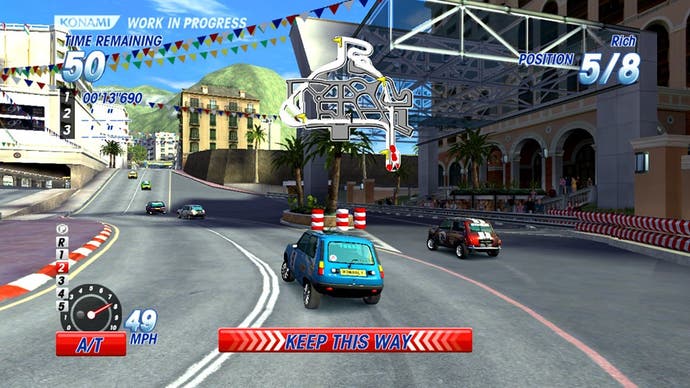GTI Club + Rally Cote D'Azur
One-track mind.
The rise of downloadable games has returned immutably single-minded arcade releases to contemporary relevance in a way that even the harshest retro-sceptic would struggle to condemn, and sieved through that perspective GTI Club + Rally Cote D'Azur is a shrewd piece of commissioning: a fondly remembered three-minute racer on a download service with roll-your-own pricing.
Hiring SUMO Digital was also excellent; the Northern codeshop broke the rules by eulogising OutRun 2's simplicity rather than drowning the player in misguided compensation, and it's a trick repeated here. Contracting SUMO is more perceptive than at first appears, too; when asked, the developer extended OutRun 2 with rarefied compassion. Who better to build on GTI Club + if it succeeds?
But we're getting ahead of ourselves. SUMO hasn't; the Cote D'Azur setting is rendered out in pin-sharp 720p at mostly 60fps, but the real-time reflections and shadowing of the buffed-up Mini Coopers and Golf GTIs are restrained and humble guests at a banquet of nostalgically blocky buildings and nakedly regimented and paraded NPC traffic obstacles under cheery blue skies. It's achingly, but lovingly game: cement flower-beds tumble and loop across an overpass on sufficient, speed-sapping impact; an uphill launch past a garage must veer left or right or be impaled upon an invisibly-walled triangular outpost for pumps in a petrol station forecourt; and player vehicles spin on the spot upon impact with an NPC, or cartwheel elaborately if they land on a downturned nose, most notably at the foot of a rough shortcut from the top of the hill above the single town circuit that makes up the initial release.
It all works mostly because the rules are set and defined within minutes. The frazzling oversteer (d-pad prevails) and handbrake turns, the need to preserve momentum (particularly on the Hard mode's ultimate hill-climb), the unyielding and efficient AI (probably rubber-banding, but the course masks this). There are shades of Midnight Club in the game's cruelly slow acceleration (although it makes more sense in a hatchback than a Dodge Challenger) and constant restarts, but whereas Rockstar used deceptively elaborate incidental details, none of which restrained your movement, to keep tension at the redline, SUMO is more economical with its petite racecourse, perhaps realising that the greatest thrills are in the brake timing at the knotted tunnel hairpins, the needle-threading of the street corner dash beyond the level crossing, and zigzagging a transition between a steep downhill right-hander and an opposing on-ramp.

That bit calls to mind equivalent lines in OutRun 2 - you could even argue that OutRun 2 is those two or three seconds over and over again for five minutes - but OutRun's physics are so abstract that they invite comparisons to Scalextric (one poster on Rock, Paper, Shotgun noted, "It's more like Audiosurf than a racing game"), and even an average player, caught in the initial swell of understanding and refinement in the face of an uncrossed checkpoint's kill-switch, is gloriously empowered by the sweep of a powerslide. That first hour in GTI Club is fraught, by comparison, and even once you're closeted in the solitary confinement of perfecting the lap, you still reach for the restart button over and over. A good game of OutRun represents improvement; a good game of GTI Club represents fewer imperfections. It's a better game for chasing leaderboards as a result, experimenting with different cars and routes, but it's the source of its esotericism.
Away from single-player, GTI Club doesn't bother with split-screen - probably the biggest disappointment - but it does have eight-player racing, team-play, and Bomb Tag, in which the explosive is transferred between opposing cars on contact. It doesn't quite fit - GTI Club aches to be conquered through skill and refinement, rather than elongated by kiss-chase - but it's still good. Multiplayer could do with TrackMania's trick of turning off collisions, however, showing competitors as ghosts and perhaps preserving NPC interaction across the netherworld of spectral crossover, to get the most out of its passionate time-trialling. Then again, we're the grumpy loners of twitch-racing; you're just a lap-time we haven't beaten yet. Playing with other people is fierce and unsympathetic, and we hope the servers stay full.
Even if they don't, GTI Club + is a short, sharp thrill aimed at a growing niche, although the almost-sensible price is derided by the superior value in PSN team-mate WipEout HD. There will be days when it hands you the pad, you put every wheel in the wrong place, and throw the pad back again, but there will be many more where you pour yourself into every millisecond of braking. It's a game fundamentally incapable of not running you down now and then, but the clarity of control and aspiration give wry subtext to its rightful claim to "high definition".
GTI Club + Rally Cote D'Azur is due out exclusively (for now) on PlayStation Network this Thursday, 4th December. It costs GBP 9.99.








